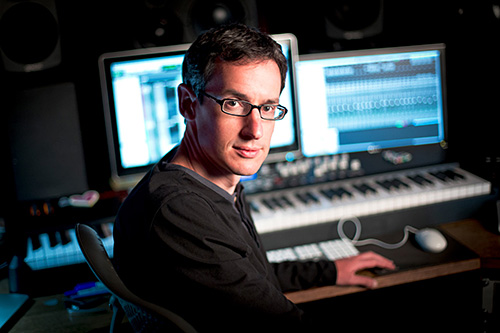

  |
|
|
||||||||||||||||||||||
|
FMS FEATURE... February 25, 2014 Steven Price's Immersive Music for Gravity British composer's score sends career into Oscar orbit by Jon Burlingame  In fact, Price was initially hired for just two weeks to help the Gravity team prepare for an early screening. "Can you help us do some music stuff?" Price remembered being asked. "It was all very open – two weeks of trying to give them something." Price, 36, now has his first Academy Award nomination. The Nottingham-born, Cambridge-educated composer was previously known as a top U.K. music editor, having worked on Batman Begins, the last two Lord of the Rings films and a few others. His one big credit as a composer was the sci-fi comedy The World's End. Gravity, Price said, offered "this amazing canvas, with no sound in space," and Cuaron's demand that it should have "no conventional music" made the idea of a temp track (temporary music usually applied during the editing process) "absolutely impossible." So Price began inventing sounds in his studio and sending them to Cuaron. "He started giving me notes back, and I started doing a bit more. It kind of accelerated and, a few weeks in, he basically said, 'Would you like to come on as composer?' "The idea," Price explained, "was helping you experience what Ryan (Sandra Bullock) was experiencing. If she was overwhelmed, the music needed to feel overwhelming; if she was feeling desolate and alone, the music needed to feel as small and delicate and broken as it possibly could." Because of the absence of sound, the score had to accomplish more than the usual: "Whilst you've got the depth of the 3D image, the music needed to give you this immersive experience by totally surrounding you. The score could shift and mutate and transform in various ways, depending on where the camera was and what the characters were doing." Price's challenge was not simply to score Ryan's plight (and that of her colleague Matt, played by George Clooney) but also to engineer the placement of the music around the theater using the Dolby ATMOS system. "Whether a musical composition or the technology of it, [the idea was] to completely immerse you in the emotional experience." Cuaron never wanted to know exactly how Price came up with his sounds. But, Price said, "he's a great collaborator. I would send him demos every few days." They worked on the music for an entire year. Much of Price's score is manufactured using electronic means, although there is a growing use of acoustic sounds as the score progresses until the finale, which is entirely orchestral and features, quite prominently, a wordless female voice. "It was literally a laboratory at times," Price notes, "taking a cello note but passing it through a synthesizer or guitar pedal." In terms of recording musicians, here were "a lot of smaller sessions, and a couple of bigger ones at the end," Price reported. "Solo cello carried the early melodies. I did a string octet in Abbey Road Studio Two. There are a lot of individual layers to the score." There is also considerable glass harmonica, Price said: "It's otherworldly, but incredibly human," present in much of the score's textural material. There's also organ, recorded in a church in East London. That human voice is also present throughout the film, although sometimes disguised or barely audible. "A lot of the textures are vocally derived," Price said. "It tends to be associated with Ryan's daughter and moments of her extreme adversity, total desolation and hopelessness. Gradually, it becomes more explicit." Price ultimately composed 80 minutes of music for, he says, "a director who encouraged you to push things as far you possibly could." ©2014 Jon Burlingame |
Search
Past Features
Feature Archives
|